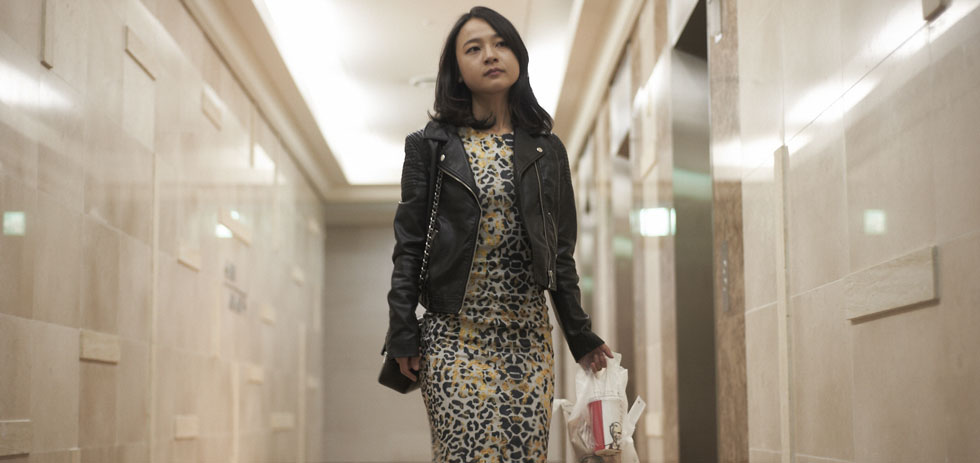
We open on the beige walls of a high-rise apartment. A young woman, sharply dressed in business attire, sits calmly on the couch, flipping through a magazine – but only pausing at the jewelry ads within – whilst sipping from a coffee thermos, the kind coated in a clear layer of plastic to protect the hands from any residual heat. A real estate agent walks around the space and talks through the various features of the apartment, paramount among them is the view of the city. The young woman smiles neatly. The real estate agent starts to mention rental prices and the young woman cuts her off; she wants to buy the place. “You’re so mature for your age” the real estate agent remarks. The young woman smiles and nods subtly.
The purchase never goes ahead, nor does that of an expensive refrigerator she attempt to buy in the next scene. Over the course of The Liar, this young woman walks through appliance stores, car dealerships and more apartment inspections, carefully crafting her exit for each one – an excuse to do with her fictitious husband perhaps, or she forgets her wallet and agrees to transfer money later. It’s a string of amusing, low-stakes cons, at least until the reality of her life becomes apparent.
Ah-young (Kim Kko-bbi) works as a beautician (of sorts) in a combination hotel and salon, mostly popping the pimples of clients, makes a low wage and is completely alienated from her co-workers, most of whom she also concocts a fiction for, one involving an absentee fiancee. She lives with her alcoholic sister and her brother – her sister’s husband is implied to have lived with them but became increasingly absent the more his wife drank – in a small apartment cluttered with boxes. Their mother lives comfortably with her new husband, with whom Ah-young had a falling out years prior. From what we see, she’s stuck in this cycle of mundanity, her lies a means of projecting an idealised view of her life; her greatest aim, she says, is to lead a “normal life”, but her sense of normalcy is warped by the catalogues she reads, and shaped by the fear of gossip from her co-workers. In this seemingly plain environment, director Kim Dong-myung reveals the oddly normalised persecution of identity, disguised and positioned as small talk, and posits that this new normal derives from a societal pressure to seem content, rather than actually be it.
Lee Sun-young’s cinematography isn’t particularly alluring but that’s the point, the often harsh artificial light mirroring that of the hotel lobby and department stores. The visuals map out a world in which the aura of consumerism is inescapable, even in Ah-young’s own home. The small number of locations helps, too, circling back on her apartment, the salon, the car dealership, as if to further that the very notion of leaving the city, or job, or life, is inconceivable.
Though the script is quite pointed, particularly with regards to the faux-romance between Ah-young and a low-level imported car dealership employee (played by Chun Sin-hwan), there are aspects of the film that are too neatly designed; the alcoholic sister is undeveloped, the sudden appearance of her seemingly neglectful mother is also too obviously constructed as an emotional gut-punch rather than an organic reveal. What is organic, though, and what carries the film through some artificial seeming moments, is the central performance by Kim Kko-bbi, who manages to impressively convey an almost everpresent crisis of identity in a way that is amusing and complex.
The film ends on an abstract visual punchline, which left many members of the MIFF audience murmuring expletives of confusion, but it’s a very amusing rejoinder to Ah-young’s own demand: “pull yourself together”. The Liar offers no neat answers, nor a particularly broad social satire. Instead, it’s an intimately focused character study that ends up cleverly commenting on the internalised pressures of a upwardly mobile social class, whilst gradually revealing Ah-young to be not necessarily a punchline to visual humour but an empathetic protagonist caught between the act of daydream and the depth of delusion.
